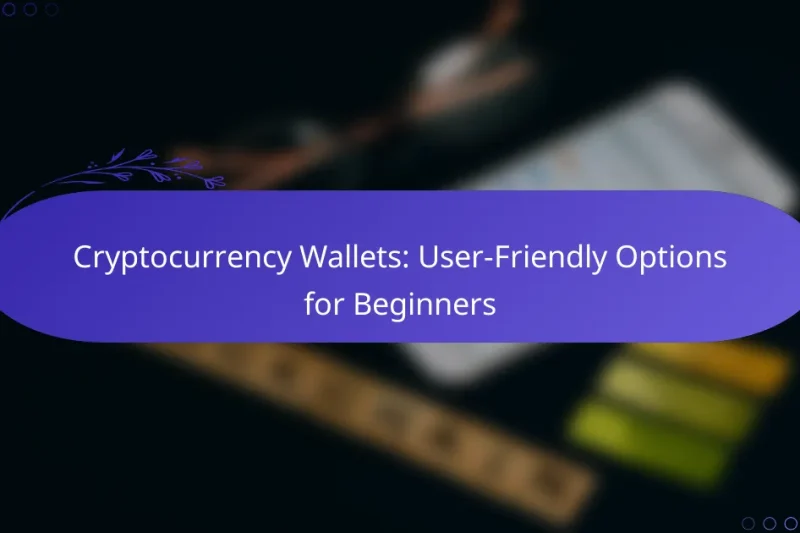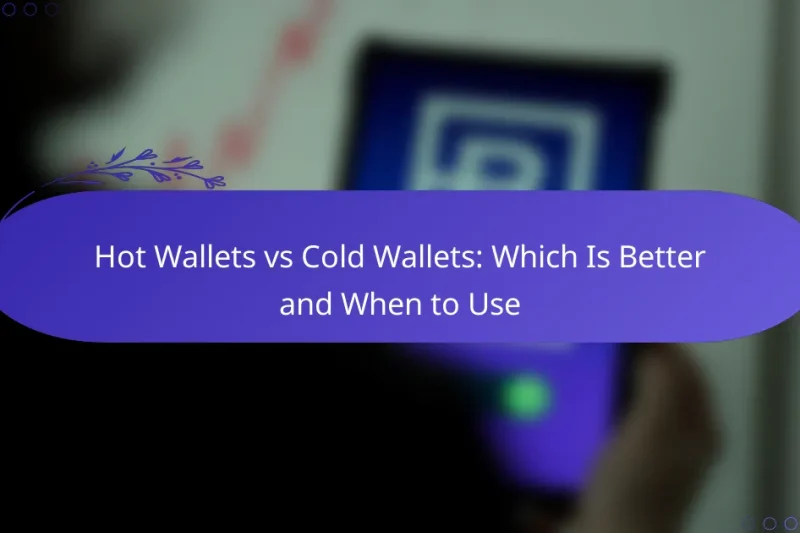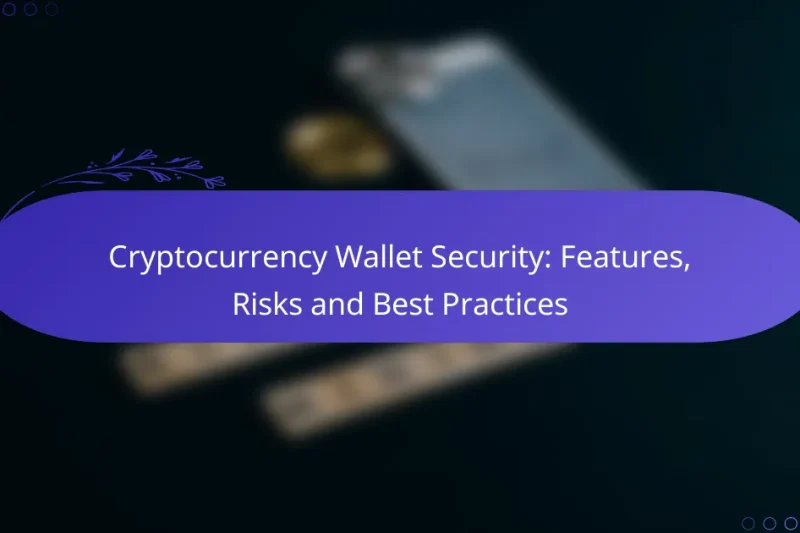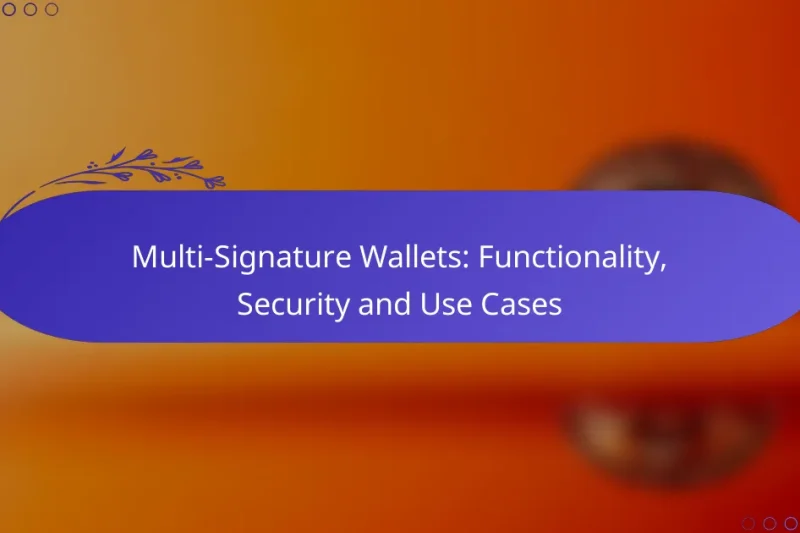Choosing the right cryptocurrency wallet is essential for optimizing your investment strategy while ensuring the security … Cryptocurrency Wallet: Investment Strategy, Security Features and User ExperienceRead more
Cryptocurrency Wallets
Cryptocurrency wallets are essential tools for managing digital currencies, allowing users to send and receive funds securely. They store public and private keys, facilitating transactions on the blockchain without holding the actual coins. With various types available, including hot and cold wallets, users can choose options that best suit their security needs and preferences.
Cryptocurrency Wallets: User-Friendly Options for Beginners
For those new to the world of cryptocurrency, selecting a user-friendly wallet is essential for a … Cryptocurrency Wallets: User-Friendly Options for BeginnersRead more
Hot Wallets vs Cold Wallets: Which Is Better and When to Use
Hot wallets and cold wallets serve distinct purposes in the realm of cryptocurrency storage. Hot wallets, … Hot Wallets vs Cold Wallets: Which Is Better and When to UseRead more
Cryptocurrency Transfer: Methods, Safety and Best Practices
Transferring cryptocurrency can be accomplished through various methods, including peer-to-peer, exchange, and wallet-to-wallet transfers, each offering … Cryptocurrency Transfer: Methods, Safety and Best PracticesRead more
Cryptocurrency Storage: Safety, Long-Term Strategies and Best Practices
Storing cryptocurrency securely is essential for protecting your digital assets from unauthorized access and potential losses. … Cryptocurrency Storage: Safety, Long-Term Strategies and Best PracticesRead more
Cryptocurrency Wallet Security: Features, Risks and Best Practices
Cryptocurrency wallet security is essential for protecting your digital assets from unauthorized access and potential loss. … Cryptocurrency Wallet Security: Features, Risks and Best PracticesRead more
Multi-Signature Wallets: Functionality, Security and Use Cases
Multi-signature wallets provide an advanced layer of security by requiring multiple private keys to authorize transactions, … Multi-Signature Wallets: Functionality, Security and Use CasesRead more
What are the best cryptocurrency wallets in the USA?
The best cryptocurrency wallets in the USA offer a combination of security, user-friendliness, and support for various cryptocurrencies. Popular options include Coinbase Wallet, Exodus Wallet, Ledger Nano X, and Trust Wallet, each catering to different user needs and preferences.
Coinbase Wallet
Coinbase Wallet is a user-friendly mobile wallet that allows users to store a wide range of cryptocurrencies securely. It is separate from the Coinbase exchange, giving users full control over their private keys and funds.
This wallet supports various tokens and NFTs, making it suitable for those looking to manage diverse digital assets. Additionally, it offers features like decentralized application (dApp) access and seamless integration with the Coinbase exchange for easy transactions.
Exodus Wallet
Exodus Wallet is known for its intuitive interface and robust security features, making it ideal for beginners and experienced users alike. It supports numerous cryptocurrencies and allows for easy swapping between them directly within the wallet.
Exodus also offers a built-in exchange feature, enabling users to trade assets without leaving the app. Its desktop and mobile versions sync seamlessly, providing a consistent experience across devices.
Ledger Nano X
Ledger Nano X is a hardware wallet that provides top-notch security for cryptocurrency storage. It stores private keys offline, protecting them from online threats, which is crucial for long-term investors.
This wallet supports over 1,800 cryptocurrencies and features Bluetooth connectivity for mobile use. While it requires an initial investment, the enhanced security makes it a worthwhile option for serious investors.
Trust Wallet
Trust Wallet is a mobile wallet that is officially endorsed by Binance, offering a secure and versatile platform for managing cryptocurrencies. It supports a wide array of tokens and allows users to interact with decentralized exchanges and dApps.
Trust Wallet is easy to set up and use, making it a great choice for newcomers. Its built-in Web3 browser enables users to explore decentralized finance (DeFi) applications directly from the wallet, enhancing its functionality.
How do cryptocurrency wallets work?
Cryptocurrency wallets store your public and private keys, enabling you to send and receive digital currencies. They do not hold the actual coins but facilitate transactions on the blockchain, ensuring security and access to your funds.
Public and private keys
Public keys are like your bank account number; they allow others to send you cryptocurrency. Private keys, however, are akin to your password; they grant access to your wallet and should be kept confidential to prevent unauthorized access.
When you create a wallet, a pair of keys is generated. The public key can be shared freely, while the private key must remain secure. Losing your private key means losing access to your funds permanently.
Transaction process
The transaction process begins when you initiate a transfer using your wallet. You enter the recipient’s public key and the amount you wish to send, which is then signed with your private key to verify your identity.
Once signed, the transaction is broadcasted to the network, where it is confirmed by miners or validators. This process can take anywhere from a few seconds to several minutes, depending on network congestion and transaction fees.
To ensure successful transactions, always double-check the recipient’s address and consider adjusting transaction fees based on current network conditions. Avoid sending large amounts until you are familiar with the process to minimize risks.
What are the types of cryptocurrency wallets?
Cryptocurrency wallets come in various types, primarily categorized into hot wallets and cold wallets. Each type has distinct features, benefits, and risks that cater to different user needs.
Hot wallets
Hot wallets are online wallets that are connected to the internet, making them convenient for frequent transactions. They are typically used for day-to-day trading or spending of cryptocurrencies due to their quick access and user-friendly interfaces.
However, the constant internet connection makes hot wallets more vulnerable to hacking and cyber threats. Users should ensure they use reputable services and enable security features like two-factor authentication to mitigate risks.
Cold wallets
Cold wallets are offline storage solutions for cryptocurrencies, providing enhanced security against online threats. They are ideal for long-term storage, as they are not connected to the internet and are less susceptible to hacking.
Common types of cold wallets include paper wallets and hardware wallets. While cold wallets offer superior security, they can be less convenient for regular transactions, requiring extra steps to access funds.
Hardware wallets
Hardware wallets are a type of cold wallet that stores cryptocurrency on a physical device, such as a USB stick. They provide a high level of security by keeping private keys offline, making them a popular choice for serious investors.
When using hardware wallets, it’s essential to purchase them from reputable manufacturers to avoid counterfeit devices. Regularly updating the device’s firmware and backing up recovery phrases are also crucial steps to ensure the safety of your assets.
What are the security features of cryptocurrency wallets?
Cryptocurrency wallets incorporate various security features to protect users’ digital assets from unauthorized access and theft. Key features include two-factor authentication, backup and recovery options, and encryption methods that enhance overall wallet security.
Two-factor authentication
Two-factor authentication (2FA) adds an extra layer of security by requiring not just a password but also a second form of verification. This could be a code sent to your mobile device or generated by an authentication app. Implementing 2FA significantly reduces the risk of unauthorized access, as attackers would need both your password and the second factor to gain entry.
When choosing a wallet, look for options that support 2FA. Popular wallets often provide this feature, but ensure you enable it during the setup process to maximize your security. Avoid using SMS-based 2FA if possible, as it can be vulnerable to interception; instead, opt for app-based authentication.
Backup and recovery options
Backup and recovery options are essential for safeguarding your cryptocurrency in case of device loss or failure. Most wallets allow you to create a backup of your private keys or seed phrase, which can be used to restore access to your funds. It’s crucial to store this backup securely, preferably offline, to prevent unauthorized access.
Consider using a hardware wallet for enhanced security, as they often come with built-in backup features. Regularly test your recovery process to ensure you can access your funds if needed. Avoid sharing your backup information with anyone, as this could lead to loss of your assets.
How to choose the right cryptocurrency wallet?
Choosing the right cryptocurrency wallet involves assessing your security needs, user experience preferences, and the types of cryptocurrencies you plan to store. Consider factors like ease of use, protection features, and compatibility with various digital assets to make an informed decision.
Security considerations
Security is paramount when selecting a cryptocurrency wallet. Look for wallets that offer features such as two-factor authentication (2FA), encryption, and backup options. Hardware wallets are often considered the safest choice, as they store your private keys offline.
Be cautious of software wallets, especially those that are web-based, as they can be more vulnerable to hacks. Regularly update your wallet software to protect against security vulnerabilities and consider using multisig wallets for added protection.
User experience
User experience can significantly impact how effectively you manage your cryptocurrencies. A wallet should have a straightforward interface that allows for easy navigation and transaction processing. Look for wallets that offer intuitive features, such as transaction history and easy access to your balance.
Consider whether you prefer a mobile app, desktop application, or a web-based interface. Each option has its pros and cons, so choose one that fits your lifestyle and usage patterns. Testing a wallet with a small amount of cryptocurrency can help you gauge its usability before committing larger amounts.
Supported cryptocurrencies
Different wallets support various cryptocurrencies, so it’s essential to ensure that your chosen wallet can accommodate the assets you intend to hold. Some wallets are designed for specific coins, while others support a wide range of cryptocurrencies.
For example, if you plan to store Bitcoin, Ethereum, and several altcoins, opt for a multi-currency wallet. Always check the wallet’s official website or documentation for a complete list of supported cryptocurrencies to avoid any compatibility issues.
What are the fees associated with cryptocurrency wallets?
Fees associated with cryptocurrency wallets can vary significantly based on the type of wallet and the services it offers. Users should be aware of transaction fees, maintenance fees, and potential withdrawal fees that may apply when using different wallets.
Transaction Fees
Transaction fees are charged when sending or receiving cryptocurrencies. These fees can fluctuate based on network congestion and the specific cryptocurrency being used. For example, Bitcoin transaction fees can range from a few dollars to over $20 during peak times.
When selecting a wallet, consider the average transaction fees associated with it. Some wallets allow users to set their own fees, which can help manage costs during times of high demand.
Maintenance Fees
Maintenance fees are periodic charges that some wallets impose for account upkeep. Not all wallets have these fees, but those that do may charge monthly or annual fees. For instance, some custodial wallets may charge around $5 to $10 per month.
Before choosing a wallet, check if it has any maintenance fees and how they compare to other options. Free wallets may be appealing, but ensure they meet your security and usability needs.
Withdrawal Fees
Withdrawal fees apply when transferring funds from your wallet to an external account or another wallet. These fees can vary widely depending on the wallet provider and the amount being withdrawn. Some wallets may charge a flat fee, while others may take a percentage of the withdrawal.
To minimize costs, look for wallets with low or no withdrawal fees, especially if you plan to move funds frequently. Always review the fee structure before committing to a wallet to avoid unexpected charges.






